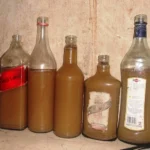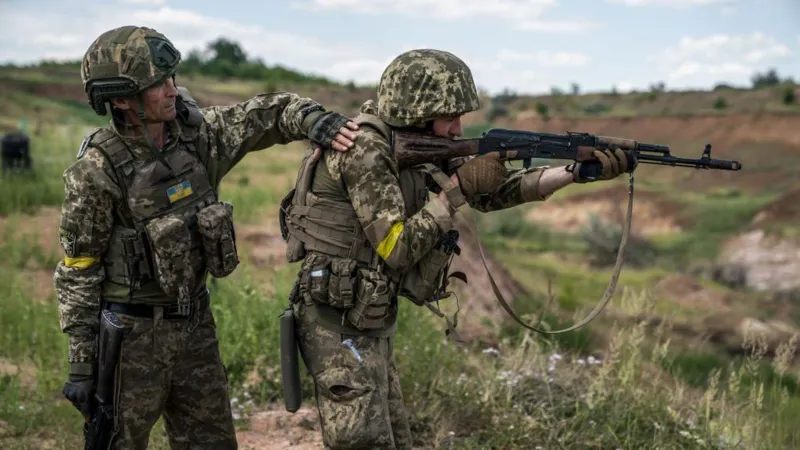According to a stealthy investigation by a German newspaper, the European Union is secretly funding some countries and agencies to prevent migrants from accessing Europe.
In Mauritania, Morocco and Tunisia, migrants are brought to remote areas and abandoned without food or water – some of them right in the desert a DER SPIEGEL investigation revealed.
Timothy Hucks couldn’t believe it. How could it happen to him, of all people, an American who would never dream of climbing into a refugee boat bound for Europe?
Bella, a young woman from Guinea, descended into panic. She begged the policeman not to leave her in the middle of nowhere – a place she didn’t know and suspected might not be safe. In vain.
François, a musician from Cameroon, was worried about his family. As GPS data confirms, he found himself standing in a barren gorge with his wife and her son with no food or water. He and the other refugees were told to follow the light. And then, they were left alone.
The Sahara is the largest hot desert in the world. Even its perimeter, characterized by barren, arid landscapes, can be dangerous. On cloudless winter nights, temperatures can drop below freezing, while on summer days, the mercury can climb well beyond 40 degrees Celsius (104 degrees Fahrenheit).
Now, the wasteland is increasingly used as a weapon. African governments are abandoning people like Timothy Hicks, Bella and François to send a message to migrants: Don’t even try. You’re not going to make it to Europe.
The European Union pumps billions of euros into the region. Officially, the money is for migration management: African countries have been tasked with preventing migrants from embarking on the trip across the Mediterranean – purportedly in accordance with human rights. The EU insists it has nothing to do with the practice of abandoning migrants in remote areas.
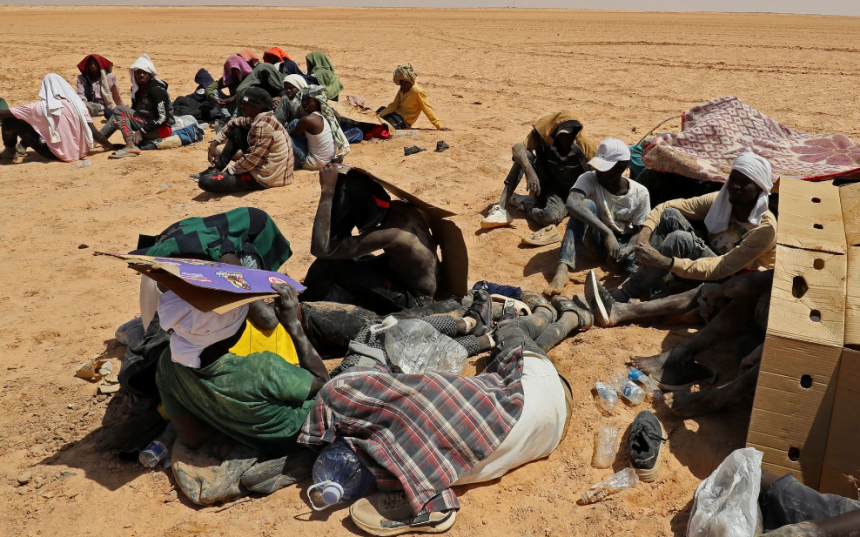
DER SPIEGEL, in cooperation with the non-profit investigative newsroom Lighthouse Reports and additional media outlets from eight different countries, set out to determine if that’s true.
Reporters traveled to Tunisia, Morocco and Mauretania, the countries with which the EU works especially closely. They verified videos and shot them themselves wherever possible. They examined satellite images and confidential documents, spoke with dozens of migrants and interviewed diplomats, EU officials and police officers.
More than 50 migrants told reporters that they have been abandoned in remote areas by security personnel. Together, these stories in combination with additional reporting have produced a clear picture: These actions are far from isolated incidents. Indeed, they are systematic. In Tunisia, Morocco and Mauretania, thousands of Black people are arrested, taken to remote desert areas and abandoned.
The reporting shows that EU member states and the European Commission don’t just know about the abandonments, but they also equip the security forces that commit them.
The Europeans have paid for the refurbishment of detention facilities, provided pickups and offroad vehicles, trained security forces and even patrolled together with them.
In some places, according to an eyewitness, representatives from European security agencies have even received lists containing the names of the migrants that are to be abandoned.
Europe’s efforts to secure its borders have thus been shifted far to the south. For people from sub-Saharan Africa, the border is no longer at the Spanish exclave of Melilla or on the Italian island of Lampedusa, but at the edge of the Sahara far to the south.
In Morocco, Mauretania and Tunisia, the operations are referred to as “refoulement,” which essentially means forced return. They tend to follow the same pattern: Asylum seekers, or people the security forces believe to be asylum seekers, are detained either on the streets or at sea, locked into prison camps and then later abandoned at remote places, sometimes in the middle of the desert. The migrants must then find their own way back to civilization.
Some of those abandoned are robbed or tortured. Others have reportedly died. Timothy Hucks, Bella and François all managed to survive. In this story, they each talk about a phase of this ordeal.
Hucks provides his complete name, but both Bella and François only reveal their first names out of security concerns.
Timothy Hucks was in the mood to get drunk when he headed out onto the streets of the Moroccan capital of Rabat in March 2019. His girlfriend had just broken up with him.
She had hardly left the house when Hucks, now 33, set his mobile phone on the table and stuffed 100 dirham into his pocket, enough for the wine he so badly needed, according to the story he tells.
Hucks had just put a quiche in the oven, he says, and he left it there to finish cooking. The store, after all, was just a few minutes away. At a traffic circle, Hucks says in a telephone interview, he heard a voice behind him.
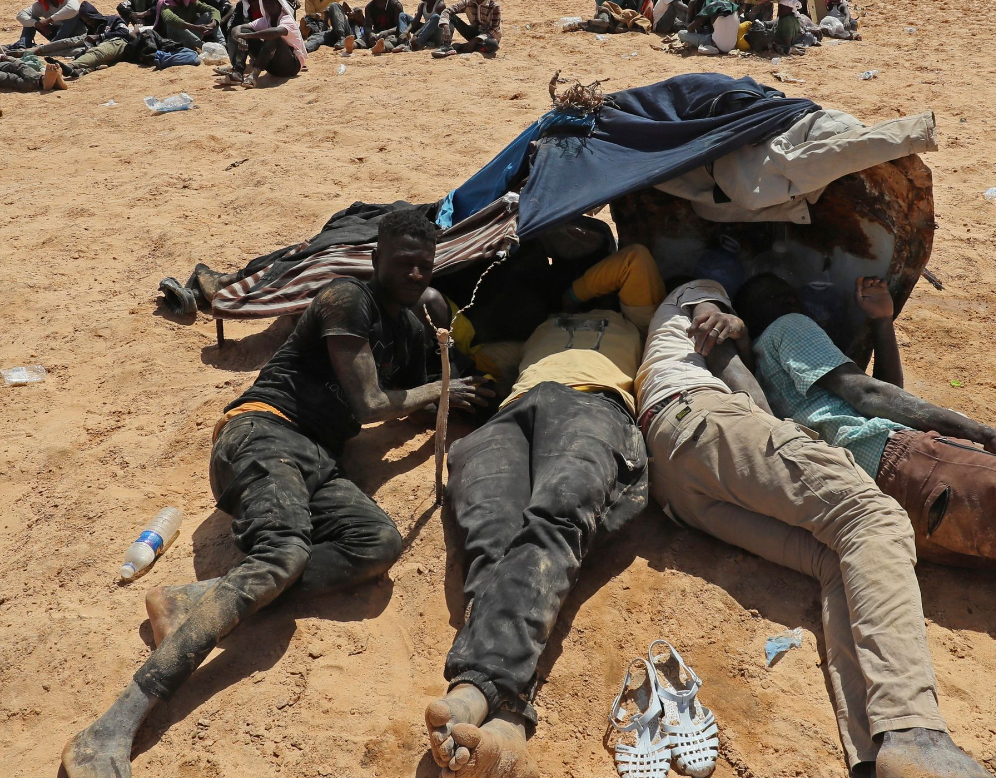
“Bonjour, bonjour,” the man called out and grabbed Hucks by the T-shirt. Hucks says that it was only then that he realized he had been stopped by police officers in civilian clothing.
Hucks says that he told the officer that he was from Rochester, New York, and had been working for the last two years in Rabat as an English teacher. He says he also showed the officer his American driver’s license and offered to retrieve his U.S. passport from his apartment.
But the officers weren’t interested. The men, says Hucks, put him in handcuffs and shoved him into a van. Only then did he see the other occupants of the van: They were all Black, he says. Just like himself.
Those interested in deporting migrants and asylum seekers must first catch them. And there is hardly a country out there that seems to do so as effectively as the autocratic Morocco.
According to official statistics, security forces made more than 75,000 arrests of migrants last year because they had attempted to “emigrate illegally.”
In the capital of Rabat and in the coastal towns of Tangier, Tan-Tan and Nadar, gendarmes and members of the Auxiliary Forces are constantly on patrol.
Their methods, as documented in videos, witness testimony and reports from the EU and the United Nations, are not particularly refined. The security forces hunt down people from sub-Saharan Africa. And mistakes, like the one made in the case of Timothy Hucks, cannot be excluded.
In the northern part of the country, arbitrary arrests have become normal. Every Black male knows that it is better to avoid going out onto the street during the day in some city districts, says Camara Gaamo Mafa, who works with an association that supports unaccompanied minors in Morocco.
There are women and men who have been picked up dozens of times. Others disguise themselves. One man from Guinea says that he often takes along the child of a friend of his. “The police don’t stop me when I’m carrying a three-year-old,” he says.
If you spend enough time in northern Morocco, you will eventually have the opportunity to film such an arrest yourself. On a hot day in October, a delivery van belonging to the Auxiliary Forces could be seen coming to a sudden stop at the edge of a market.
A security agent in a red shirt grabbed a Black man. His fellow agents opened up the back door and shoved the man inside before they then drove off. The entire operation took just a few seconds.
Sometimes, even those who want to voluntarily leave Morocco are apparently detained. One young man, also from Guinea, says that he had been on his way to a UN office to get his papers for his return trip. But instead of sitting in a plane on the way home, he suddenly found himself in a police cell.
When reached for comment, Moroccan authorities denied all human rights violations. The “relocation of migrants to other cities” is intended to protect them from trafficking networks” and “keep them away from dangerous areas like forests and deserts.” Ethnic criteria, they insisted, are not used as the basis for the arrests.
Timothy Hucks still doesn’t know for sure what police station the officers brought him to that day. He recalls a large, dark room, the toilets broken and the floor covered in filth. Around 40 Black men were cowering inside – men from Senegal and Nigeria.
The security forces, Hucks recalls, took his fingerprints and a photo. They asked questions that sounded a lot like accusations, he says. Was he a terrorist? Did he belong to Boko Haram? “It’s hard to describe just how pissed off I was at that moment,” Hucks says. “It was completely unjust. Bullshit.”
Internally, the EU has documented the activities of security forces in Morocco. In 2019, for example, the European Commission wrote in a report about a “campaign” against “sub-Saharan refugees and asylum seekers.”
Thousands, including children and pregnant women, the report noted, had been illegally detained and then taken to remote areas. A document from the EU border control agency Frontex from February 2024 also included such accusations, explicitly mentioning the use of “racial profiling.”
One could give the EU a pass due to the fact that the Moroccans don’t send the migrants out of the country. According to asylum seekers and videos, one shot by the reporters themselves, they are usually abandoned far inland, in small towns like Errachidia and Beni Mellal, hundreds of kilometers from the coastal cities from which the boats heading for Europe embark. Some EU partner nations in Africa, though, take things a step further.
Police armed with Kalashnikovs are patrolling in front of the Ksar prison camp in the Mauritanian capital of Nouakchott. The walls of the prison on this January day are colored yellow from the desert sands and the air is so dry that the reporters have trouble swallowing.
Bella is sitting on the floor of a cell behind these walls. The police, as she will later relate, confiscated her mobile phone and other personal items. Photos from the inside the facility show mint-green walls and brown tiling. On some days, children are held here as well.
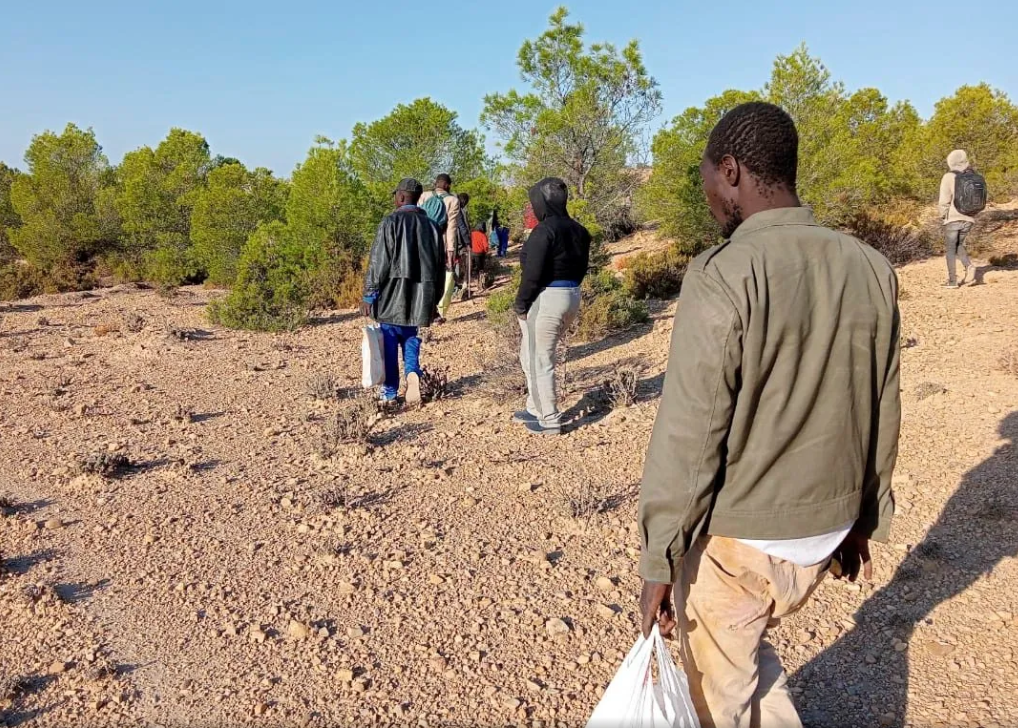
Bella, 27, is from Koubia, a village in northern Guinea. She tells her story several days later, her face covered so she cannot be recognized in photographs. Bella says that she was married to an older man when she was just 16.
Shortly afterwards, he moved with her to Gambia. He beat her frequently, she says. When her husband died, she decided to emigrate to earn money herself. She left her three children with her brother and his wife. How could she have brought them along, she asks?
Bella initially sold coconuts in Nouakchott. She says that she had a residency permit to stay in Mauritania but is no longer able to provide proof. On the streets of the city, Bella met a woman from her region in northern Guinea who had also lost her husband. They decided to stick together from then on.
They hoped to be able to reach the Canary Islands together and start a new life in Europe. In January, she says, her dream came to an end on a vessel belonging to the Mauritanian Coast Guard: After 10 days at sea, she says, the boat she had been traveling in was intercepted.
Spain has been working together with Mauritanian officials for several years to stop migrants before they reach the Canaries. The voyage across the Atlantic is considered one of the deadliest migrant routes in the world, but nevertheless, more asylum seekers are currently reaching the islands than ever before. This year, the total has already exceeded 16,000 – and many of them set off from Mauritania.
Which is why Spanish Prime Minister Pedro Sánchez and European Commission President Ursula von der Leyen traveled to Nouakchott in early February. The two of them promised more than 500 million euros for the Mauritanian government, with the government tasked with “managing” migration in exchange.
The fact that the European Parliament had earlier warned of “systemic and serious human rights violations,” “arbitrary arrests and detention,” “cases of torture,” and “abusive collective expulsions to Senegal and Mali” went unmentioned.
According to four eyewitnesses, Spanish police officers can frequently be seen going in and out of the prison in Ksar and they regularly patrol together with Mauritanian police forces as well. As the Spanish police has publicized in a YouTube video, they also intercept migrants at sea in joint operations.
A database of public tenders, compiled by the Madrid-based non-profit foundation porCausa, shows how many projects the Spanish government finances, including the renovation of migrant camps and the delivery of inflatable rafts, offroad vehicles and drones – often with the help of the national development aid agency FIIAPP.
Behind the prison walls, the migrants are prepared for deportation. Bella says that she was photographed by Spanish police officers while in prison. One eyewitness, who is in contact with the reporters of this story, says that Spanish officials also took photos of the migrants. According to the witness, the deputy director of the detention facility additionally provided lists to Spanish officials of migrants who were to be deported.
When reached for comment, the Spanish Interior Ministry said that the 50 Spanish police officers in Mauritania respect the human rights of the migrants in addition to other national and international legal provisions.
FIIAPP said in a statement that Mauritanian officials are only allowed to use equipment for the purposes for which they are intended – the fight against migrant smuggling and irregular migration. Ultimately, though, the Mauritanian officials themselves are responsible for ensuring the supplies are used in a legal manner. FIIAPP claims to adhere to international standards itself and says it has not observed any human rights violations.
The Mauritanian government admits to sharing certain data with Spanish officials and says that it deports irregular migrants to neighboring countries. But such deportations, the government insists, only take place at official border crossing points and in accordance with international and national law.
On this January day in Nouakchott, the heavy metal gates of the prison open at 6 p.m. A Toyota bus with more than 20 migrants onboard turns onto N3, the only paved road connecting the southwest of the country with the southeast. The drive to Gogui, the border crossing to Mali, takes around 15 hours. Reporters follow the bus for 16 kilometers before turning around for safety reasons.
Bella will later recognize the bus driver from photos. She says she pleaded with the guards not to send her to Mali. Jihadist groups in the country harass the populace and the Wagner Group, the mercenary militia from Russia, has even executed civilians, according to media reports. Fighting is frequent. For this reason, even orderly deportations to Mali could violate international law.
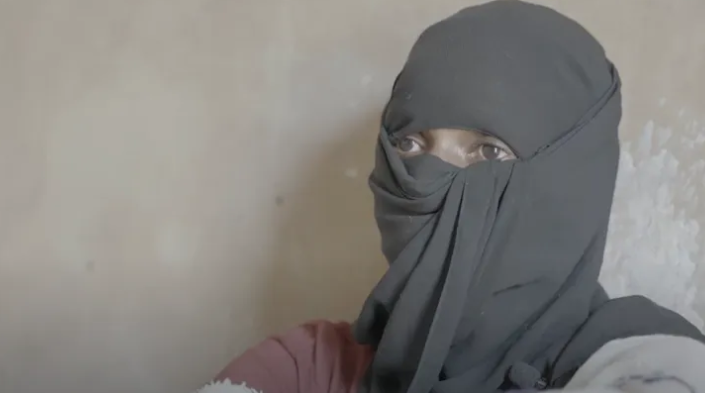
Bella says she was afraid of being raped. Without a mobile phone, she wasn’t even able to ask her relatives back home for money. Once in Gogui, she says, officials forced her and the others to get off the bus and then herded them across the border like animals. “They wanted to be sure that we went into Mali. We were in the middle of the wilderness. There was nothing there.” Then, she says, the bus drove off.
When a person doesn’t get enough to drink, it damages their kidneys, their blood pressure sinks, their cells begin to shrink and their brains are not adequately supplied. Headaches follow, then hallucination. Later, perhaps unconsciousness.
François, a slender 38-year-old with short dreadlocks, says he was desperate with fear when the Tunisian National Guard abandoned him and other refugees in September on the Algerian border at the edge of the Sahara. He’ll make it back somehow, he thought to himself. But the others in the group? His wife and her five-year-old son? The two pregnant women? The boy with an Achilles tendon injury who could only walk with pain?
The voyage across the Mediterranean was frightening, François would later say in an interview in Tunis. But it was nothing compared to the God-forsaken region where they were abandoned. It was a place, he says, where you had to be certain of the direction you were walking. “Otherwise, nature is going to take care of you.”
François remembers a barren gorge surrounded by small mountains. Algerian border guards fired warning shots when the group drew close.
When the first rays of sun appeared, the migrants decided to head for Tunisia, back to the country they were familiar with. They were discovered by the National Guard before noon, after just a few kilometers. This time, according to GPS data on their mobile phones, François and the others were abandoned a few kilometers further to the north – even closer to the border.
François is from Jaunde, the capital of Cameroon. He used to make music there – Afrobeat, hip-hop and R&B, he says. He left his country in 2022 following a dispute in the neighborhood. In Tunisia, François worked as a day laborer. And he was able to get by for quite some time. But then, the Tunisian president held a speech.
In that February 2023 speech, the increasingly authoritarian Kais Saied told his country that “hordes of illegal migrants” were part of a “criminal plan” to change the “demographic makeup” of the country. It was Saied’s version of the conspiracy theory known as the “great replacement.” Later, a murder allegedly committed by a migrant further inflamed the mood. Since then, it has felt at times like open season on foreigners.
It is possible that Saied’s speech was intended to lay the groundwork for a new, more severe approach to dealing with migrants. On June 11 of last year, Ursula von der Leyen paid a visit to the autocrat in Palais de Carthage in Tunis together with Italian Prime Minister Giorgia Meloni and Netherlands Prime Minister Mark Rutte.
“Team Europe,” as the trio of leaders called themselves, had one primary demand: They wanted Saied to block the flow of asylum seekers, increasing numbers of which had been setting off for Italy from the Tunisian coast. In return, they promised him up to a billion euros, over 100 million euros of which was earmarked for border controls.
Not long later, Tunisian police and National Guard members began loading migrants into buses by the thousands, and videos of the operations quickly began circulating on the internet. Some migrants, like François, were taken to the Algerian border, while others were bused in the other direction to Libya. In one video, dozens of migrants can be seen. A voice from off camera says: “We are in the desert. There is no water and no food.”
A report by the United Nations Support Mission in Libya (UNSMIL) notes that Tunisian security forces were continuing to transfer migrants to the Libyan border area. By the end of March, the report notes, 8,664 people had been intercepted there by Libyan officials – and at least 29 people have died, the report claims. As recently as May, reporters from this investigation spoke with migrants in the Tunisian-Libyan border region who said they had been abandoned there.
The Tunisian government rejected the accusations when approached for comment and insisted they adhered to international regulations and human rights laws. At the same time, though, the government says it is determined to defend the “integrity of its territory” and take action against migrant smuggling networks.
The German government, meanwhile, does not deny that deportations in the middle of the desert are taking place. In response to a parliamentary query made by Left Party lawmaker Clara Bünger in September, the government wrote it was monitoring the situation with concern.
The government wrote that it has “condemned the deportation of refugees and migrants in the Libyan-Tunisian and Algerian-Tunisian border regions and called for these practices to be stopped and for information to be provided.”
For the government in Berlin, the abandonments are especially sensitive since the German Federal Police has been training and equipping the Tunisian National Guard since 2015. The Germans have sent boat motors, inflatable boats, night-vision goggles and pickups – equipment worth 31 million euros.
The German Interior Ministry says it is vital that the equipment provided be used “exclusively for the purpose intended.” Humanitarian standards and the human rights of the refugees and migrants must be respected, the ministry said in a statement.
“This is also a regular element of our discussions with the Tunisian side.” The “strengthening of the rule of law, human-rights compliance and proportionate police action” are fundamental to the project. For that reason, the ministry said, cooperation with Tunisian security forces will be continued.
The European Commission also emphasizes that it expects its partners to uphold international obligations. Ultimately, however, says Brussels, the countries themselves are responsible for the activities of their own security authorities.
François’ next attempt to leave the border region started at night. They decided, he says, to only walk in darkness, hoping to do everything they could to avoid walking into the arms of the National Guard again. They even walked through the mountains in some stretches to avoid being seen.
François says that his body felt completely dried out on some days. After a week, he says, he started losing his balance. The blisters on his feet hurt, as did his back and hips. Photos on his mobile phone show the group marching through the Savanne, looking for shade under the trees.
“It was my sprit that kept walking,” says François. Every now and again they would find a stream or a friendly soul who gave them water.
The group wandered aimlessly for nine days before finally reaching Tajerouine, a town of a few thousand residents. François recalls an olive orchard where he fell to the ground in exhaustion.
The farmer bought medicine for them and his wife cooked. The next day, the farmer also paid for the group’s trip to the coastal city of Sfax. Everyone in the group survived. “We were very lucky,” says François.
“Do no harm” is the central principle of European development aid. But in the fight against irregular migration, that apparently no longer applies. A country in Africa that promises the EU to close its borders has to somehow get rid of the migrants that have made it that far – or at least make life difficult for them, says a man who spent years working on EU projects in North Africa.
Timothy Hucks now lives in Spain. After Moroccan security forces, he says, abandoned him in the inland town of Beni-Mellal, he bought a bus ticket to Rabat. When he got home, he found a burned quiche in the oven.
Bella says she spent four days wandering aimlessly in Mali until she found a small village. Today, she lives in poverty in Senegal. She hasn’t seen her children – aged 12, nine and five – for two years. She can’t return to Guinea without money, she says. Instead, she plans to return to Mauretania and look for work.
François says he has since tried again to cross the Mediterranean by boat. And was again intercepted by the Coast Guard and abandoned. In truth, he says, the Europeans are the problem. They are the ones supplying the boats. Still, he hasn’t given up his dream of reaching Europe. With enough patience, he says, he’ll get there one day.
Gate

